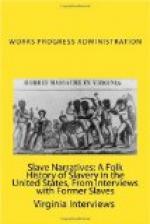GWCronyn/a
[Document 2] (Transcript of Preceding Autograph Memorandum) [Transcriber’s Note: The handwritten version is included in the original volume.]
4/9/37
Mr. Cronyn:
In replying to this letter I should like for you to commend especially two stories:
1. Lula Flannigan by Sarah H. Hall Athens, Ga.
2. Uncle Willis, Miss Velma Bell, Supervisor, Athens, Ga.
All the stories are worth while but these two are mainly (one entirely) in dialect and abound in human interest touches. All the interviewers should copy the Negro expressions.
I much prefer to read unedited (but typed) “interviews,” and I should like to see as soon as possible all the seventy-five to which Miss Dillard refers.
It is most important, too, to secure copies of “slave codes, overseers codes and the like.” This item is new and all the states should send in similar material.
Yours,
John A. Lomax
[Document 3]
Sent to: North and South Carolina, Georgia,
Alabama,
Louisiana, Texas, Arkansas,
Tennessee,
Kentucky, Missouri,
Mississippi,
Oklahoma.
April 14, 1937
Mr. Edwin Bjorkman
State Director, Federal Writers’ Project
Works Progress Administration
City Hall, Fifth Floor
Asheville, North Carolina
Dear Mr. Bjorkman:
We have received more stories of ex-slaves and are gratified by the quality and interest of the narratives. Some of these stories have been accompanied by photographs of the subjects. We would like to have portraits wherever they can be secured, but we urge your photographers to make the studies as simple, natural, and “unposed” as possible. Let the background, cabin or whatnot, be the normal setting—in short, just the picture a visitor would expect to find by “dropping in” on one of these old-timers.
Enclosed is a memorandum of Mr. Lomax with suggestions for simplifying the spelling of certain recurring dialect words. This does not mean that the interviews should be entirely in “straight English”—simply, that we want them to be more readable to those uninitiated in the broadest Negro speech.
Very truly yours,
George Cronyn
Associate Director
Federal Writers’ Project
GWCronyn:MEB
This paragraph was added to the letter to Arkansas.
Mr. Lomax is very eager to get such records as you mention: Court Records of Sale, Transfer, and Freeing of Slaves, as well as prices paid.
Negro Dialect Suggestions (Stories of Ex-Slaves)
Do not write:
Ah for I
Poe for po’ (poor)
Hit for it
Tuh for to
Wuz for was
Baid for bed
Daid for dead




